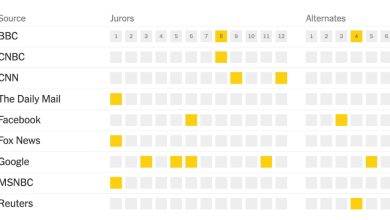New York Is About to Blow Its Budget Deadline. Here’s Why.

ALBANY, N.Y. — With a number of knotty issues continuing to stymie negotiations, state leaders seemed intent on blowing past a midnight deadline on Thursday to reach agreement on a new state budget.
The April 1 deadline had seemed achievable, with ample federal funds allowing Gov. Kathy Hochul, a Democrat, to propose a record $216.3 billion in spending. Her first executive budget was aimed at jump-starting the state’s pandemic recovery through investments in education, infrastructure and health care.
But members of the Democrat-controlled Legislature had countered with even more robust financial plans, costing at least $6 billion more than the governor’s proposal.
And on Thursday afternoon, the odds of an on-time budget evaporated as the State Senate adjourned until April 4. (The Assembly, the larger, slower-moving chamber, also gaveled out on Thursday.)
Nonfiscal policies are often stuffed into the springtime budget process, and the biggest obstacles this spring are complicated social issues that have divided lawmakers, particularly the question of revisiting the sweeping bail reform law that was part of the 2019 budget deal.
Other contentious issues also loom, but veterans of the budget process can testify that once the big stuff gets done, less complicated deals tend to fall into place.
While the April 1 deadline is in the State Constitution, no state checks will be delayed unless a deal is delayed past 4 p.m. on Monday, according to the state comptroller.
After the Legislature adjourned, Ms. Hochul issued a statement offering a hopeful prognosis, even though her first budget is late. “We are getting closer to agreement, with consensus on major policy items,” she said. “New Yorkers should know that progress is being made.”
Here’s a quick look at where negotiations lie on some outstanding issues, from more money for child care to takeout alcohol.
Bail reform could be the key to everything
Three years later, the 2019 landmark changes to bail law are still rattling around the halls of Albany, causing agita for some Democratic lawmakers and anger for others.
Ms. Hochul has proposed a series of new changes, responding to a pandemic-era rise in violent crime and, perhaps, Republican success in attacking Democrats on bail reform. She called for an expansion of the number of crimes eligible for bail and for allowing judges to consider the danger a defendant poses in deciding bail. But those ideas, backed by Mayor Eric Adams, have met resistance in both the Senate and Assembly.
Republicans — in the minority in both chambers — have continued hammering Democrats on bail, hoping to use the issue to gain seats in the fall’s campaigns, including for governor. (That race, at least, is a long shot: Republicans are badly outnumbered in the state and haven’t won a statewide race in two decades.)
Andrea Stewart-Cousins, who leads the State Senate, said on Thursday afternoon that she expected some changes to the bail laws to be included with the budget, but she flatly rejected the dangerousness provision. “We’ve always stood the same way,” she said. “We’re not introducing dangerousness.”
New York City casinos are still on the table
The state has already hit it big with mobile sports betting, which began in January, and lawmakers seem ready to press their luck by allowing a handful of new casinos to start taking bets in New York. Those new gaming halls would probably be authorized in the New York City area — including inside city limits — unlike earlier expansions which focused on upstate economic development.
Such a plan — which would authorize three new casino licenses — already has developers and casino operators salivating and lobbying hard: Millions have been spent by gambling companies to push the state to fast-track the current timetable, which called for expansion to be delayed until 2023.
Now, however, with support from Governor Hochul, the deal seems to be gaining momentum, perhaps because of the bonanza that the state has already been seeing from mobile betting: tens of millions of dollars in tax revenue since January, as bettors quickly made New York the top mobile-betting state in the nation.
Senate Democrats have also embraced the idea — proposing that operators pay a minimum of $1 billion for each license — though some Assembly Democrats still seem circumspect, as do many Manhattan lawmakers, who fear that neon lights and craps tables might be detrimental to their neighborhoods.
With so much money at stake, many believe that the city will soon see a casino, even if it is on edge of town, where operations like Resorts World New York in Queens — which only offers computerized gaming, not in-person table games or poker — have been hugely successful.
One casino-adjacent issue that seemed likely to be approved despite dismay from lawmakers was an appropriation for a new $1.4 billion stadium for the Buffalo Bills, a deal that comes with a promise of some $850 million in public funds.
Earlier this week, Ms. Hochul said that about half of that public funding would come from revenues recently paid to the state by the Seneca Nation, which operates three casinos in Western New York. The decision to use the tribal payment for the stadium prompted a furious response from the Seneca leaders, who called the use of their money for the Bills’ benefit part of the state’s “long history of mistreatment and taking advantage of Native people.”
SUNY + CUNY = Money
Democrats have proposed pumping more money into the State University of New York and the City University of New York in order to recruit new faculty and bolster the operating and capital expenses for the system, which has nearly 375,000 students.
Democrats also want to boost the state’s tuition assistance program, following a push by a coalition of student and staff calling for restoration of funding to the public university systems, which have a history of being the subject of cuts.
This year, it seems more money, not less, will flow to SUNY and CUNY, though the exact number will likely wait until more contentious issues (see above) are settled.
Child care and health care, too
Another of the top priorities for Democrats in Albany this year is to invest billions in child care for low-income families, as well as to offer support for new and existing day care centers; lawmakers envision the proposals as the first steps toward a universal child care system in New York that would provide free child care to all, regardless of income.
That utopian vision aside, this, too, is a dollars-and-sense discussion that may well only be finalized after more thorny negotiations over bail and other issues are complete.
All the major players have offered more money for child care, ranging from Ms. Hochul — who put forth a $1.4 billion plan — to the State Senate, which has a version that would cost $4 billion.
Also still being debated was a $345 million proposal to provide health care coverage for undocumented immigrants, which supporters say would strengthen the social safety net under more than 150,000 low-income people who are barred from insurance because of their immigration status. This comes a year after the state gave more than $2 billion to undocumented workers who suffered loss of income because of the pandemic.
Ms. Hochul’s budget officials have questioned the price tag of somelawmakers’ budget proposals, saying legislators have far underestimated potential costs. But supporters like Ms. Stewart-Cousins said such spending was aimed at making up for years of disinvestment, laid bare by the trials of the coronavirus.
Mayor’s hope for school control is just that
The newest player in the budget negotiations — at least in absentia — is Mayor Adams, who seemed likely to endure a common feeling for New York mayors in Albany: disappointment.
Even though it includes a major contingent of city-based Democrats, the Legislature has not embraced his wish to extend mayoral control over New York City schools for another four years.
Democrats in both chambers have traditionally supported advancing mayoral control but took the view that it was a policy discussion that could be had outside the budget talks, since control does not expire until June.
Still, city lawmakers would most likely be able to claim victory on a number of issues near and dear to their residents, including pretty predictable increases in spending for schools.
As a man fond of nightlife and the industry that surrounds it, Mr. Adams may also be pleased with progress on a proposal to allow restaurants and bars to sell alcoholic drinks to go, a practice that was temporarily made legal during the pandemic. Ms. Hochul had backed a plan to make to-go drinks permanent despite 190-proof opposition from the influential liquor lobby.
Ethics, anyone? OK, how about a tax freeze?
There seemed to be some momentum for a new ethics agency to police Albany, an always-tough job that has been the subject of decades of failed attempts. But a reported proposal to replace the Joint Commission on Public Ethics (whose members are named by the executive branch and legislative leaders) with another panel (whose members would be named by the executive branch and legislative leaders) has already run afoul of good-government groups who have lived through similar iterations.
A proposal that is likely to be more popular is a legislative plan to temporarily suspend a state tax on gasoline through Dec. 31 — a move also supported by Republicans in a rare instance of bipartisanship inside the State Capitol.
The governor had initially expressed some doubts, though the continued rise in prices at the pump has made a deal more palatable, with Ms. Hochul saying “the timing of the budget is perfect to address this.”
Another possible cherry on top of the eventual budget deal is the fast-tracking of an existing middle-class tax credit, a move that Ms. Hochul supports.
Grace Ashford and Dana Rubinstein contributed reporting.




